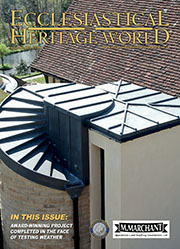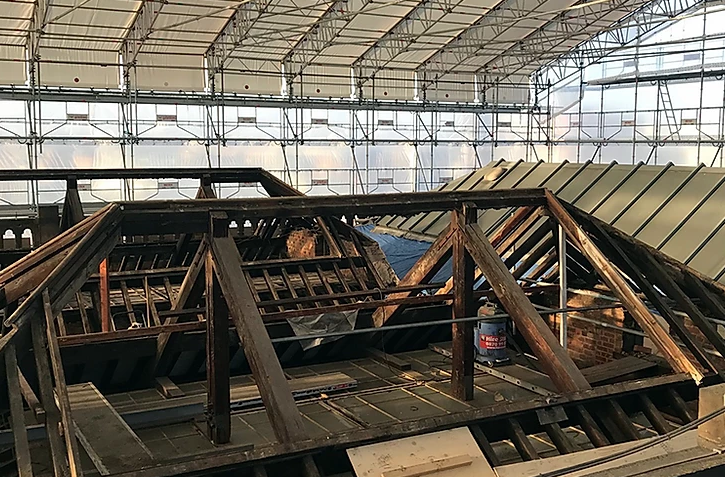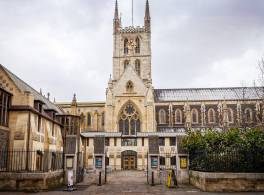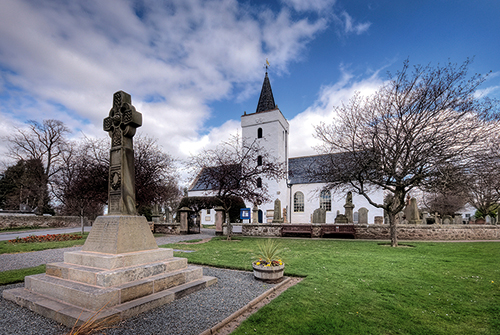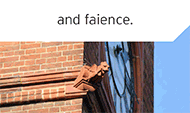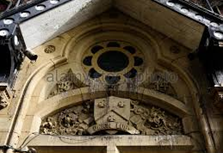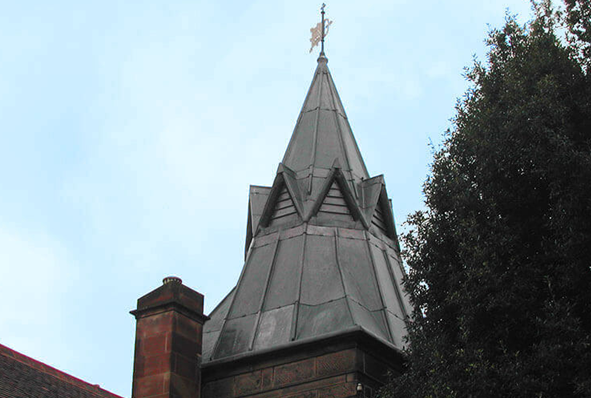Heritage Roofing
Heritage roofing - maintaining our iconic buildings
The UK is home to some of the most iconic buildings in the world, from stunning churches and cathedrals to historic stately homes. Each and every one of these remarkable feats of architecture requires regular maintenance to ensure they remain in the very best condition, allowing them to be enjoyed for generations.
Cathedral Care
Restoration and upkeep of cathedrals
There are some 42 Anglican cathedrals in the UK, not to mention 20 or so Catholic cathedrals. Cathedrals form the most important collection of historic buildings in England. The largest and most ancient are internationally famous, the smallest are usually among the most significant buildings in their region and even the most recent are architectural masterpieces.
Master Craftsmen
Championing our heritage with modern craftsmanship
Twenty years ago, English Heritage (now Historic England) published its first-ever Register of Buildings at Risk across England, which featured nearly 2,000 buildings and monuments that were ‘neglected, broken and unloved’. Recently Historic England was delighted to announce that over two-thirds of those buildings were now safe, in both urban and rural areas right across the country.
Lightning Protection
When lightning strikes are you protected against this act of God?
The issue of lightning protection in churches is one that has exercised this publication for many years. In this four-part series of spotlights on the issue we will be revisiting various aspects of the subject, beginning with an overview of current thinking.
Traditional Lime
Lime: it’s better for buildings – and for the environment
It is now fairly well known that cement is not good for old buildings and that lime mortar should be used. But why? What are the advantages and what are the disadvantages? In order to begin to answer those questions it is necessary to understand the nature of traditional building, the process by which buildings used to be built, and how it differs from modern construction, the process by which we build today.
Audio Visual
Audio visual equipment in church buildings
This guidance is issued by the Church Buildings Council under section 55(1)(d) of the Dioceses, Mission and Pastoral Measure 2007. As it is statutory guidance, it must be considered with great care. The standards of good practice set out in the guidance should not be departed from unless the departure is justified by reasons that are spelled out clearly, logically and convincingly.
Read More...
CRE Events
All change at CRE: the UK’s ‘ideal church show’
The Christian Resources Exhibition (CRE), the UK’s largest church-related show, has changed hands in its 40th year and has been taken over by Quartz Business Media.
Insurance
You need to ensure that reasonable precautions are in place at your church to keep it safe for those who use it. To do this, you need to think about what might cause harm to people.
You will then need to decide if the precautions already in place are adequate. If they are not, you may need to identify further action to prevent any danger. When done formally, this is known as a risk assessment.
LPOW Grants
£23 million government package to support restoration of thousands of listed places of worship
Heritage Minister Sir Chris Bryant has announced that the Listed Places of Worship Grant Scheme will be extended into the next financial year, providing £23 million so that thousands of historical buildings, including churches, synagogues, mosques and temples, can carry out restoration work.
Church Maintenance
Church maintenance and repair: Calendar of Care
Just as prevention is always better than cure, maintenance is preferable to major repairs. But, such repairs may not always be avoidable. Church Care offers a monthly guide in our coming issues Starting in Spring
We can help you understand the common problems and areas that need your special attention, and give you tips for regular maintenance schemes.
Pest Control
Michael Palin warns of pest threat to churches
Michael Palin is supporting the future of the UK’s historic churches and chapels with a voiceover for a new animated film. The 80 second animation, produced for the National Churches Trust, highlights why churches are some of the nation’s best loved buildings.
Town Halls
The history of the great Victorian Town Halls of Northern England
From industrial squalor to civic pride, the story behind some of the most impressive buildings of the North involve a unique mix of economics, grand designs and noble sentiments within communities.
Lead Roofing
Lead is one of the oldest materials in the roofing industry and is still commonly used throughout the world today.
Lead roofing is a traditional roofing method which has been used in the industry for hundreds of years, and is therefore proven to be extremely reliable. Lead roofing, and sand-cast lead, in particular is ideal for old buildings such as churches or historical renovations, whereas milled lead roofing is a mass-produced alternative, used for precision and accuracy in homes and commercial buildings alike.
SEARCH OUR DIRECTORY
Two Commissioner vacancies announced
The Department for Culture, Media and Sport is seeking to appoint individuals with expertise in i) Education/Community Engagement, and ii) Local Authority Representation as Commissioners of English Heritage.
English Heritage flies the flag for England
In 1568 while staying at Carlisle Castle in Cumbria, Mary Queen of Scots became the first recorded monarch to actively enjoy watching a football match. Twenty of her retinue played a two hour game and according to Sir Francis Knollys, all played "very strongly, nimbly and skilfully, without any foul play offered."
12 million restoration of Chiswick House Gardens unveiled
Chiswick House Gardens is a site of international importance both as the birthplace of the English Landscape Movement, and as the setting for one of the most beautiful houses in London. The regeneration of the gardens is a result of many years of campaigning, four years of fund-raising and two years of work on the site.
English Heritage (manager of the House) and the London Borough of Hounslow (owner of the Gardens) established The Chiswick House and Gardens Trust as an independent charity to drive forward an ambitious rescue plan for the Gardens and secure its future for the 21st century.
The garden restoration, managed by English Heritage, and supported by a Heritage Lottery Fund grant of £7.9 million, recovers the original vistas and design from decades of disrepair and underfunding, and also repairs and restores the statuary and garden buildings. The result is an inspiring balance between a historic landscape and a public park.
Highlights include the planting of over 1,600 trees, including trees propagated from the original 18th century cedars of Lebanon; the opening up of historic views from the Classic Bridge, the complete restoration of the 19th century conservatory housing a rare and internationally important collection of camellias; the planting of native trees and shrubs in the Northern Wilderness, and the restoration of the Walled Gardens, which will be open to the public on special days.
To complement the restoration, award-winning architects Caruso St John have designed a new café within the grounds, on a carefully chosen site close to Chiswick House on the east side. The new café provides indoor seating for 80 people and external seating for over 100, and forms the social hub for the park, with a newly created children’s playground beside it.
Effective answer to scrap metal crime wave
In response to the huge increase in the theft of scrap metal, wireless security specialists Tag Guard Ltd have developed a purpose-designed solution that could become a major deterrent.
New faces grace Chapter House restoration
The future of one of London’s oldest buildings, the Chapter House at Westminster Abbey, has been secured following a major English Heritage-led repair and conservation project. Over the past 18 months a team of 20 master carvers and stonemasons has painstakingly cleaned, repaired and conserved the badly weathered gargoyles, stone floral friezes, flying buttresses and stained glass windows. The colossal scaffolding has now come down to reveal the majestic exterior completely refreshed, revived and weather-tight.National Trust introduce new apprenticeship scheme
The National Trust has created a new Apprenticeship Scheme in a bid to tackle the severe building skills shortage in the heritage sector.The programme, which is aimed largely at 16 – 19 year olds, will train young men and women in traditional skills including stone masonry, carpentry, joinery, lead work, plumbing, painting and decorating.
Heritage Lottery Fund invests £17m in skills
Today, the Heritage Lottery Fund (HLF) has announced an investment of £17m – treble the amount it originally set aside - in 54 projects under its Skills for the Future programme¹. This money will deliver 808 placements and adds-up to an impressive 780 years’ worth of paid training opportunities for people across the UK seeking a career in heritage. It will not only support traditional conservation training but also a wide variety of more contemporary skills, such as managing volunteers and using social media to get people involved in heritage, that will help reinvigorate and broaden the appeal of the heritage industry to job-seekers.
Heritage Lottery Fund invests over £1m in skills in the North East
Today, the Heritage Lottery Fund (HLF) is announcing an investment of almost £1.2m into three projects across the North East under its Skills for the Future programme.
Draft Kings Park plan out for consultation
A draft plan to transform Stirling’s Kings Park to meet the needs of the whole community now and in the future is out for consultation.The Kings Park in Stirling is a park steeped in the history of Stirling and Scotland and also a much loved, contemporary green space in the heart of the city providing leisure and pleasure to City residents and visiting tourists as well as offering stunning views to Stirling Castle and the distant hills.
Major Makeover For Gateway to Ayr Town Centre
A multi-million pound project to transform the historic gateway to Ayr town centre is due to get underway later this year thanks to funding from South Ayrshire Council and the Heritage Lottery Fund (HLF).The HLF monies (£1.08 million) will supplement the Council’s investment in the Ayr Townscape Heritage Initiative (Ayr THI) to provide grant funding of more than £2.5 million for the repair and refurbishment of properties within the THI area, with the priority buildings being on New Bridge Street – known locally as the ‘pink buildings’.
Knight Frank Scoops Scottish Natural Heritage Maintenance
Knight Frank’s building consultancy team has won a three year contract to manage planned maintenance to Scottish Natural Heritage’s property portfolio across Scotland.Pittencrieff House Museum Restoration Begins
An ambitious £260,000 restoration of Pittencrieff House, one of Dunfermline’s most historic buildings, gets under way this week.
To mark its 400th birthday, the exterior of the house is undergoing major restoration which is expected to be complete by the autumn.
English Heritages historical archive catalogue now online
 For the first time the public will be able to search online a catalogue describing more than a million historical photographs and documents relating to England's historic buildings and archaeological sites held by the National Monuments Record (NMR), English Heritage's public archive
For the first time the public will be able to search online a catalogue describing more than a million historical photographs and documents relating to England's historic buildings and archaeological sites held by the National Monuments Record (NMR), English Heritage's public archive
Chief Executive welcomes conservation of Chapter House
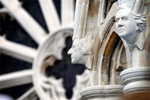 On Tuesday, 26 May 2010 a reception was held at Westminster Abbey to mark the completion of the repair and conservation of the exterior of the Chapter House. English Heritage's Chief Executive Dr Simon Thurley delivered the following speech, touching on the significance of the building, the craftsmanship involved in the project, the publication of a new book on the Chapter House as well as the current economic climate and as announced recently by the Government, the cuts to the public sector.
On Tuesday, 26 May 2010 a reception was held at Westminster Abbey to mark the completion of the repair and conservation of the exterior of the Chapter House. English Heritage's Chief Executive Dr Simon Thurley delivered the following speech, touching on the significance of the building, the craftsmanship involved in the project, the publication of a new book on the Chapter House as well as the current economic climate and as announced recently by the Government, the cuts to the public sector.
£7million to help repair England's historic places of worship
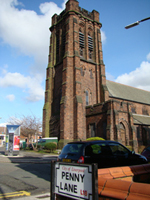 English Heritage and the Heritage Lottery Fund announce grants to help restore Grade II listed places of worship
English Heritage and the Heritage Lottery Fund announce grants to help restore Grade II listed places of worship
English Heritage (EH) and the Heritage Lottery Fund (HLF) have today (Monday 24 May 2010) announced funding of £7million to help restore 68 historic Grade II listed places of worship in England. Places of worship from a range of faiths and denominations are set to benefit from the organisations’ joint Repair Grants for Places of Worship programme.
The buildings set to benefit include the Memorial Community Church, a Grade II listed Baptist Church in Newham, East London; the Church of the Sacred Heart, a Grade II listed Roman Catholic Church in Portsmouth; and the Church of St Peter and St Paul in Lincolnshire.
Future of Buriton Chalk Pits secure thanks to Heritage Lottery Fund grant
 Buriton Chalk Pits, near Petersfield, East Hampshire, is to be saved thanks to nearly £150,000 from the Heritage Lottery Fund (HLF).
Buriton Chalk Pits, near Petersfield, East Hampshire, is to be saved thanks to nearly £150,000 from the Heritage Lottery Fund (HLF).
The money will be put towards conserving the ecologically valuable chalk pits in Buriton, a well-loved Local Nature Reserve and Site of Importance for Nature Conservation.
It will pay for a programme of maintenance work including scrub clearance and the creation of new habitats. New paths will be created and existing ones improved, local school children will be shown the natural and industrial history of the pits and a part-time ranger will be employed by Queen Elizabeth Country Park to help manage the site.
Eglish Heritage Project
 The Heritage Lottery Fund (HLF) has awarded a grant of £44,900 to Eglish Historical Society for a new project that will explore and record the history of the parish, it was announced today.
The Heritage Lottery Fund (HLF) has awarded a grant of £44,900 to Eglish Historical Society for a new project that will explore and record the history of the parish, it was announced today.
The two year project, ‘Eglish through the Ages’, will capture and record the cultural and natural heritage of the area over the past centuries to ensure its preservation for future generations. At least fifteen volunteers will be recruited to help research, compile and record the heritage of the parish under the themes of history, literature, sport, folklore, politics and the industrial past.
The unique heritage of Eglish includes its ancient church site, which is believed to have been a centre of worship since the dawn of Christianity, the base of an early Celtic cross, the sweat-house at Cadian and other places of historic significance including hill-forts, crannogs and holy wells. Part of the Battle of Benburb was fought within the parish boundaries, Harper O’Neill is believed to be buried in the church grounds and connections with the milling industry date back to early monastic times, giving the area a rich heritage.









